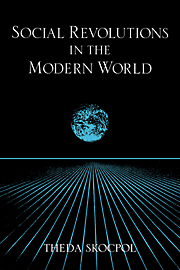Book contents
- Frontmatter
- Contents
- Acknowledgments
- INTRODUCTION
- I DOING MACROSCOPIC SOCIAL SCIENCE
- II MAKING SENSE OF THE GREAT REVOLUTIONS
- III A DIALOGUE ABOUT CULTURE AND IDEOLOGY IN REVOLUTIONS
- IV FROM CLASSICAL TO CONTEMPORARY SOCIAL REVOLUTIONS
- 9 What makes peasants revolutionary?
- 10 Rentier state and Shi'a Islam in the Iranian Revolution
- 11 Explaining revolutions in the contemporary Third World
- 12 Social revolutions and mass military mobilization
- CONCLUSION
- Index
12 - Social revolutions and mass military mobilization
Published online by Cambridge University Press: 05 June 2012
- Frontmatter
- Contents
- Acknowledgments
- INTRODUCTION
- I DOING MACROSCOPIC SOCIAL SCIENCE
- II MAKING SENSE OF THE GREAT REVOLUTIONS
- III A DIALOGUE ABOUT CULTURE AND IDEOLOGY IN REVOLUTIONS
- IV FROM CLASSICAL TO CONTEMPORARY SOCIAL REVOLUTIONS
- 9 What makes peasants revolutionary?
- 10 Rentier state and Shi'a Islam in the Iranian Revolution
- 11 Explaining revolutions in the contemporary Third World
- 12 Social revolutions and mass military mobilization
- CONCLUSION
- Index
Summary
“The changes in the state order which a revolution produces are no less important than the changes in the social order.” Franz Borkenau's insight, published in 1937, has become the central theme of more recent comparative studies. “A complete revolution,” writes Samuel P. Huntington in Political Order in Changing Societies, “involves … the creation and institutionalization of a new political order,” into which an “explosion” of popular participation in national affairs is channeled. Similarly, in my States and Social Revolutions: A Comparative Analysis of France, Russia, and China, I argue that in “each New Regime, there was much greater popular incorporation into the state-run affairs of the nation. And the new state organizations forged during the Revolutions were more centralized and rationalized than those of the Old Regime.”
Huntington has developed his arguments about revolutionary accomplishments in critical dialogue with liberal-minded modernization theorists, while I have developed mine in critical dialogue with Marxian class analysts. Modernization theorists and Marxians both analyze revolutionary transformations primarily in relation to long-term socioeconomic change. These scholars also highlight the contributions of certain revolutions to liberalism or to democratic socialism – that is, to “democracy” understood in opposition to authoritarian state power.
The classical Marxist vision on revolutionary accomplishments was unblinkingly optimistic. According to this view, “bourgeois revolutions” clear away obstacles to capitalist economic development and lay the basis for historically progressive but socially limited forms of liberal democracy. “Proletarian revolutions,” in turn, create the conditions for classless economies and for universal social and political democracy, accompanied by the progressive “withering away of the state.”
- Type
- Chapter
- Information
- Social Revolutions in the Modern World , pp. 279 - 298Publisher: Cambridge University PressPrint publication year: 1994
- 4
- Cited by



